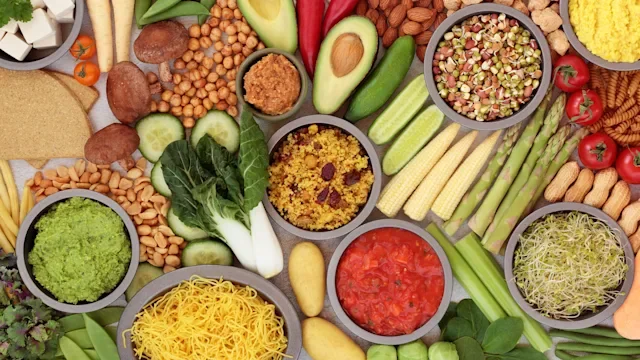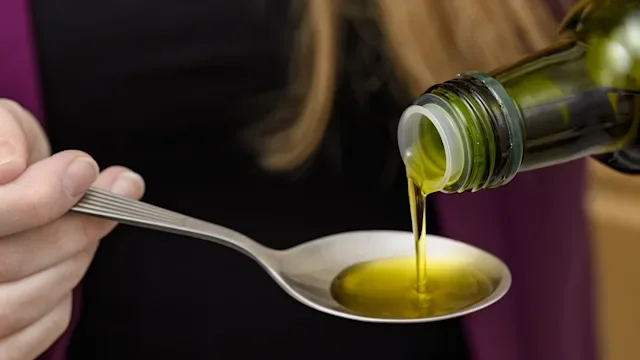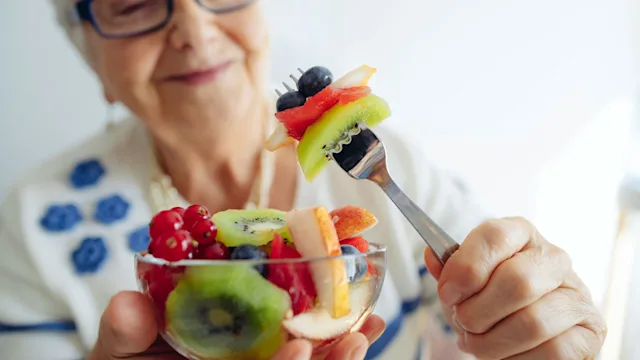Key takeaways:
The liver is part of the body’s natural detoxification system. This means it helps filter out toxins and waste products from the blood.
Foods that support liver health tend to be high in fiber, antioxidants, or healthy fats. These include foods like berries, cruciferous vegetables, beans, nuts, and fatty fish.
Avoiding certain foods — like processed foods and alcohol — will also help with liver repair.
The liver is responsible for many vital functions in your body. It helps digest food, makes proteins for blood clotting, and removes toxins and waste products from the body, among many others. Your liver takes care of you, so it’s important to take care of your liver.
Your diet plays an important role in protecting your liver so it can keep running smoothly. This is true whether you have a healthy liver or if you have liver disease — like fatty liver disease or cirrhosis. We’ll run through the best foods that can boost liver health or help repair some of the damage.
1. Cruciferous vegetables
If you love broccoli, you’re in luck. This cruciferous vegetable — along with cauliflower, Brussels sprouts, and mustard greens — are good for your liver. They are a source of fiber, which supports liver health. Plus, they contain antioxidants and phytochemicals that may help prevent liver cancer.
2. Berries
It’s smart to add blueberries, strawberries, and raspberries to your meals and snacks. They’re rich in fiber and many antioxidants, including ones called anthocyanins. Animal and lab studies have linked the powerful antioxidants in berries to reduced liver damage. The antioxidants may also help slow the growth of cancerous liver cells. But these findings aren’t yet verified in humans.
3. Grapes
Like berries, grapes contain fiber and antioxidants. More specifically, grapes contain an antioxidant called resveratrol. This may help prevent further liver damage in people with fatty liver disease. (The new term for this is now metabolic dysfunction-associated steatotic liver disease, or MASLD for short. But we’ll still refer to this as fatty liver disease in the article since people are more familiar with this term.)
Fatty liver disease is a common liver condition in the U.S. Studies show that people with fatty liver disease who take resveratrol supplements made from grape extract may have less liver inflammation. Antioxidants like resveratrol may help with oxidative stress that can worsen fatty liver disease.
4. Nuts
Nuts are full of healthy unsaturated fats, which are a good addition to your diet for multiple reasons. One study found that eating 28 g of walnuts a day (a small handful) — alongside a Mediterranean diet — may reduce your risk of developing fatty liver disease. Another study showed that diets with a higher intake of nuts are associated with a decreased risk of fatty liver disease, particularly in men.
5. Beans
The American Liver Foundation recommends reducing saturated fat and red meat in your diet. One great way to do that is to occasionally replace red meat with beans, lentils, and chickpeas. These legumes are low in saturated fat and are a source of fiber, which is a winning combination for liver health.
6. Fatty fish
Oily or fatty fish — such as salmon and trout — is a good source of omega-3 fat. Fatty liver disease is associated with diets that are too high in omega-6 fats (like from vegetable and seed oils) and too low in omega-3 fats. So, eating more oily fish can help adjust this balance. Omega-3 fats may slow the progression of fatty liver disease.
Do detox teas for the liver really work? Our experts go through the drinks and teas that are reported to help the liver — and find that some of them may actually be harmful.
Foods that are bad for your liver: Take an in-depth look at the foods that harm the liver, and how you can reverse the damage.
Medications that may cause liver damage: If you’re worried about your liver health, review the list of over-the-counter and prescription medications to avoid.
7. Coffee
Coffee is good for liver health. It has anti-inflammatory and antioxidant properties, and both decaf and caffeinated coffee seem to be beneficial. Studies suggest that a substance in coffee called diterpenes may help with detoxifying actions, which can be beneficial for people with liver fibrosis and cirrhosis. But it’s best when you don’t add a ton of sugar, because excess sugar is bad for your liver.
8. Tea
Tea, specifically green tea, contains compounds called catechins that have antioxidant and anti-inflammatory effects. Studies show that these compounds can help lower the risk of fatty liver disease. Green tea catechins may also help prevent liver cancer. But it may be best to stick with green tea rather than supplements. Green tea supplements, when taken in excess, have been linked to liver damage.
9. Olive oil
Olive oil contains phenols and monounsaturated fatty acids (MUFAs), which are known to be heart-healthy. Researchers found that when 100 people at high risk of heart disease followed a Mediterranean diet supplemented with olive oil, their risk of developing fatty liver disease was lower. In fact, several studies have looked at the effects of olive oil consumption on people with fatty liver disease. Researchers noted improvements in liver health when people added anywhere from 2 tbsp to 9 tbsp of olive oil to their diet.
Read more like this
Explore these related articles, suggested for readers like you.
10. Prickly pear
Prickly pear is a cactus that has edible fruit. In several studies in animals, it has been shown to have a beneficial effect on liver health. When rats were fed prickly pear, they were less likely to develop fatty liver. This protective effect was also seen in rats who were given alcohol to intentionally harm the liver. But there’s no good research to say whether this helps in humans, too.
11. Grapefruit
Grapefruit contains an antioxidant called naringin. In the lab, scientists have found that treating liver cells with naringin helps protect them from alcohol. Similar findings have been seen in rats that were given grapefruit juice. But again, more research is needed to know if humans get the same benefit.
12. Lean protein
Lean protein refers to protein sources that are low in saturated fat. And research suggests that the following lean proteins are particularly good for the liver:
Plant proteins: lentils, tofu, edamame, quinoa beans, nuts
Low-fat dairy: low or fat-free cheese, yogurt, and milk
A diet high in plant and dairy protein has been shown to decrease the risk of death in people with cirrhosis (an advanced form of liver disease). And adults 50 to 80 years old who ate a diet high in plant proteins experienced a decrease in liver fat after 12 months. Higher dairy protein intake in people older than 50 years also decreased the risk of fatty liver disease.
There isn’t a lot of data around the impact of lean animal proteins on liver health. And some studies show that even leaner meats like chicken and turkey can still increase the risk of fatty liver disease.
13. Avocado
Avocado is rich in fiber and healthy fats — two nutrients that can lower the likelihood of developing fatty liver disease. In animal studies, avocado was associated with less liver fat, improved liver function, and less liver damage. But we still don’t have any studies on the direct impact of avocado intake on human liver health.
Which foods should you avoid for better liver health?
If you’re adjusting your diet to help your liver, it’s just as important to avoid certain foods. Research suggests that the following foods have been associated with an increased risk of fatty liver disease:
Fast food: It tends to contain excess sugar, salt, and unhealthy fats that are bad for your liver.
Ultra-processed foods: These often contain chemicals that need to be processed by the liver, which can lead to inflammation and fat buildup.
Sweetened foods: Foods with added sugars put an extra stress on the liver. Pay attention to ingredients that contain the word syrup, juice, nectar, or end in -ose (like dextrose).
Sugary drinks: This goes beyond soda. Sports drinks, energy drinks, and fruit drinks are bad for your liver.
Artificial sweeteners: Diet foods and drinks aren’t always better for the liver. Try to avoid products that contain artificial sweeteners like aspartame, sucralose, and saccharin.
Refined grains: Try to avoid foods made with white or all-purpose flour. Opt for whole grain foods whenever possible.
Red meat and processed meat: Beef, pork, lunch meats, and hot dogs increase your risk of heart disease, liver disease, and even some types of cancer.
Alcohol: This one likely comes as no surprise. More than 7 drinks per week for women, or 14 drinks for men increases your risk of liver damage.
Even if you already have fatty liver disease, avoiding the above foods can help repair the liver and reverse the condition.
General tips for a liver-healthy diet
The items in the above list aren’t the only options for liver-healthy foods. A balanced diet in general is important to keep your liver in top shape. Here are some general guidelines that can help you build a liver-healthy diet:
Eat more fiber. Foods that contain fiber — such as vegetables, beans, and nuts — may help with optimal liver function.
Pick healthy fats. Choose foods with healthier unsaturated fats — like monounsaturated and omega-3 fats — instead of foods with saturated fat or trans fats.
Drink water. When choosing beverages, water is always a smart choice for sugar-free hydration. It helps your liver function properly and prevents dehydration.
Frequently asked questions
If you have to pick just one, water is probably the best drink for your liver. Your liver uses water to help flush toxins and waste from the body. But in addition to water, coffee and beetroot juice are also great choices for liver health. They have been studied more than others like tea, apple cider vinegar, and grapefruit juice. If you want to add one or both of them to your routine, stick with 1 cup of beetroot juice daily and/or fewer than 4 cups of coffee a day.
Maybe. Animal studies say yes:
Rats fed banana peels had improved markers of liver health.
Mice fed banana peel extract were protected from developing fatty liver disease and had less liver injury.
And bananas contain phytosterols, natural compounds that lower cholesterol and support liver health. So eating a banana every now and then may be good for your liver.
Yes, garlic is most likely good for liver repair. Garlic supplementation ranging from 800 mg to 1,600 mg daily has been shown to decrease liver fat and improve liver function in people with chronic liver disease. Still, the studies on garlic are small, and are based on people taking supplements. So it’s hard to know if garlic is good for liver health in everyone.
If you have to pick just one, water is probably the best drink for your liver. Your liver uses water to help flush toxins and waste from the body. But in addition to water, coffee and beetroot juice are also great choices for liver health. They have been studied more than others like tea, apple cider vinegar, and grapefruit juice. If you want to add one or both of them to your routine, stick with 1 cup of beetroot juice daily and/or fewer than 4 cups of coffee a day.
Maybe. Animal studies say yes:
Rats fed banana peels had improved markers of liver health.
Mice fed banana peel extract were protected from developing fatty liver disease and had less liver injury.
And bananas contain phytosterols, natural compounds that lower cholesterol and support liver health. So eating a banana every now and then may be good for your liver.
Yes, garlic is most likely good for liver repair. Garlic supplementation ranging from 800 mg to 1,600 mg daily has been shown to decrease liver fat and improve liver function in people with chronic liver disease. Still, the studies on garlic are small, and are based on people taking supplements. So it’s hard to know if garlic is good for liver health in everyone.
The bottom line
The liver is essential for your overall health. You can keep your liver functioning at its best by eating a nutritious diet that’s filled with fiber and anti-inflammatory foods. Choose lots of berries, vegetables, beans, nuts, and whole grains. Coffee and green tea are the perfect complements to a balanced diet, as these beverages also support liver health.

Why trust our experts?


References
Abenavoli, L., et al. (2017). Effect of Mediterranean diet and antioxidant formulation in non-alcoholic fatty liver disease: A randomized study. Nutrients.
Abenavoli, L., et al. (2019). Olive oil antioxidants and non-alcoholic fatty liver disease. Expert Review of Gastroenterology and Hepatology.
Alimi, H., et al. (2012). Evaluation of Opuntia ficus indica F. inermis fruit juice hepatoprotective effect upon ethanol toxicity in rats. General Physiology and Biophysics.
American Liver Foundation. (2025). Tips on how to take care of your liver.
Barroso, W. A., et al. (2022). Banana green peels extract protects against nonalcoholic fatty liver disease in high-fat-fed mice through modulation of lipid metabolism and inflammation. Phytotherapy Research.
Besné-Eseverri, I., et al. (2023). Beneficial effects of Opuntia spp. on liver health. Antioxidants.
Chen, B. B., et al. (2019). Association between nut intake and non-alcoholic fatty liver disease risk: A retrospective case-control study in a sample of Chinese Han adults. BMJ Open.
Chiara, F. D., et al. (2019). High protein diet and metabolic plasticity in non-alcoholic fatty liver disease: Myths and truths. Nutrients.
Contaldo, F., et al. (2019). Chronic inflammatory liver diseases and coffee intake. Current Opinion in Clinical Nutrition and Metabolic Care.
Crowley, E., et al. (2019). Natural and synthetic isothiocyanates possess anticancer potential against liver and prostate cancer in vitro. Anticancer Research.
Daftari, C., et al. (2023). Dietary protein intake and mortality among survivors of liver cirrhosis: A prospective cohort study. BMC Gastroenterology.
El-Mostafa, K., et al. (2014). Nopal cactus (Opuntia ficus-indica) as a source of bioactive compounds for nutrition, health and disease. Molecules.
Frasinariu, O., et al. (2022). The role of phytosterols in nonalcoholic fatty liver disease. Nutrients.
Gupta, V., et al. (2015). Oily fish, coffee and walnuts: Dietary treatment for nonalcoholic fatty liver disease. World Journal of Gastroenterology.
Iahtisham-Ul-Haq, et al. (2025). Beyond medication: Unveiling the role of diet and lifestyle in fatty liver disease management. Human Nutrition & Metabolism.
Irish, L. (2023). Choose lean proteins: What are the options? New York State Office for the Aging.
Lee, J., et al. (2021). Dairy protein intake is inversely related to development of non-alcoholic fatty liver disease. Clinical Nutrition.
Lu, W., et al. (2016). Effects of omega-3 fatty acid in nonalcoholic fatty liver disease: A meta-analysis. Gastroenterology Research and Practice.
Ma, Y., et al. (2023). Effects of olive oil on hepatic steatosis and liver enzymes: A systematic review. Journal of Functional Foods.
Mazzanti, G., et al. (2015). Hepatotoxicity of green tea: An update. Archives of Toxicology.
Meir, A. Y., et al. (2021). Effect of green-Mediterranean diet on intrahepatic fat: The DIRECT PLUS randomised controlled trial. Gut.
Miyata, M., et al. (2004). Grapefruit juice intake does not enhance but rather protects against aflatoxin B1-induced liver DNA damage through a reduction in hepatic CYP3A activity. Carcinogenesis.
Mosa, Z. M., et al. (2015). The effect of banana peels supplemented diet on acute liver failure rats. Annals of Agricultural Sciences.
Musial, C., et al. (2020). Beneficial properties of green tea catechins. International Journal of Molecular Sciences.
Pathak, M. P., et al. (2023). Therapeutic potential of bioactive phytoconstituents found in fruits in the treatment of non-alcoholic fatty liver disease: A comprehensive review. Heliyon.
Theodotou, M., et al. (2019). Effect of resveratrol on non-alcoholic fatty liver disease. Experimental and Therapeutic Medicine.
Wang, H., et al. (2017). Comparison of phytochemical profiles, antioxidant and cellular antioxidant activities of different varieties of blueberry (Vaccinium spp.). Food Chemistry.
Wernicke, C., et al. (2023). Effect of unsaturated fat and protein intake on liver fat in people at risk of unhealthy aging: 1-year results of a randomized controlled trial. The American Journal of Clinical Nutrition.
Xavier, P., et al. (2019). A Mediterranean diet rich in extra-virgin olive oil is associated with a reduced prevalence of nonalcoholic fatty liver disease in older individuals at high cardiovascular risk. The Journal of Nutrition.
Xiaohui, L., et al. (2023). Garlic supplementation for the treatment of chronic liver disease: A meta-analysis of randomized controlled trials. African Health Sciences.
Yu, L., et al. (2022). Effects of garlic supplementation on non-alcoholic fatty liver disease: A systematic review and meta-analysis of randomized controlled trials. Journal of Functional Foods.
Zhou, J., et al. (2019). Preventive efficiency of green tea and its components on nonalcoholic fatty liver disease. Journal of Agricultural and Food Chemistry.
Zhao, N., et al. (2024). Association of plain water intake with risk of all-cause and cause-specific mortality in individuals with non-alcoholic fatty liver disease or metabolic dysfunction-associated steatotic liver disease. Frontiers in Nutrition.
















